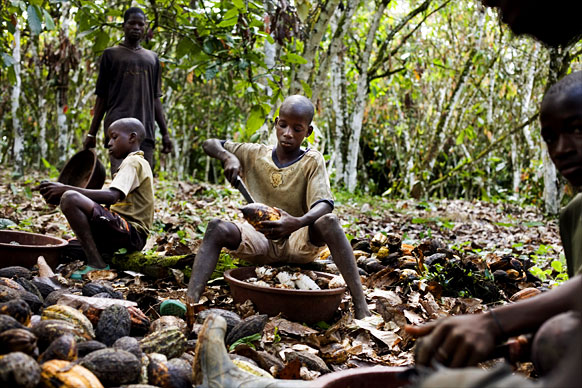http://money.cnn.com/2008/01/24/news/international/chocolate_bittersweet.fortune/index.htmPhotos:
http://money.cnn.com/galleries/2008/fortune/0802/gallery.bloodchocolate.fortune/index.htmlSeven years after the industry agreed to abolish child labor, little progress has been made.
By Christian Parenti
(Fortune) -- Outside the village of Sinikosson in southwestern Ivory Coast, along a trail tracing the edge of a muddy fishpond, Madi Ouedraogo sits on the ground picking up cocoa pods in one hand, hacking them open with a machete in the other and scooping the filmy white beans into plastic buckets. It is the middle of the school day, but Madi, who looks to be about 10, says his family can't afford the fees to send him to the nearest school, five miles away. "I don't like this work," he says. "I would rather do something else. But I have to do this."
Sinikosson, accessible only by rutted jungle tracks, is a long way from the luxurious chocolate shops of New York and Paris. But it is here, on small West African farms like these, that 70 percent of the world's cocoa beans are grown - 40 percent from just one country, Ivory Coast. It's not only the landscape that is tough. Working and living conditions are brutal. Most villages lack electricity, running water, health clinics or schools. And to make ends meet, underage cocoa workers, like Madi and the two boys next to him, spend their days wielding machetes, handling pesticides and carrying heavy loads.
This type of child labor isn't supposed to exist in Ivory Coast. Not only is it explicitly barred by law - the official working age in the country is 18 - but since the issue first became public seven years ago, there has been an international campaign by the chocolate industry, governments and human rights organizations to eradicate the problem. Yet today child workers, many under the age of 10, are everywhere. Sometimes they're visibly scarred from their work. In the village of Lilo a young boy carrying a machete ambled along a road with a bandaged shin. He said he had cut his leg toiling in a cocoa patch.

Eight-year-old twins Hassan and Hussein open cocoa pods in Ivory Coast.
The big cocoa exporters - Cargill, Archer Daniels Midland (ADM, Fortune 500), Barry Callebaut and Saf-Cacao - do not own plantations and do not directly employ child workers. Instead, they buy beans from Ivorian middlemen called pisteurs and treton. These middlemen own warehouses and fleets of flatbed trucks that travel deep into the jungle to buy cocoa from the small independent farmers who grow most of the crop. But labor and human rights activists charge that Big Chocolate has an obligation to improve working conditions on the farms where so many children toil. They argue that the exporters and manufacturers bear ultimate responsibility for conditions on the farms because they exert considerable control over world cocoa markets, essentially setting what is called the farm gate price.
A mandate versus protocol
The controversy came to a head in 2001, when U.S. Rep. Eliot Engel (D-N.Y.) and Sen. Tom Harkin (D-Iowa) introduced legislation mandating a labeling system for chocolate. The industry fought back, and a compromise was reached establishing a voluntary protocol by which chocolate companies would wean themselves from child labor, then certify that they had done so. The certification process would not involve labeling of products, but it would call for public reporting by African governments, third-party verification and poverty remediation by 2005. When none of those deadlines was met, the protocol was extended until July 2008. To turn up the heat, the U.S. Department of Labor contracted with Tulane University to monitor progress.
Tulane recently released its first report, and though the tone is polite, the picture isn't pretty. Researchers found that while industry and governments in West Africa have made initial steps, such as establishing task forces on child labor, conditions on the ground remain bad: Children still work in cocoa production, regularly miss school, perform dangerous tasks and suffer injury and sickness. The report criticized the governments of Ivory Coast and Ghana for lack of transparency. And it said the industry's certification process "contains no standards."
FULL story and several photos at link.